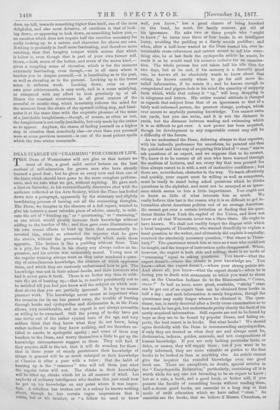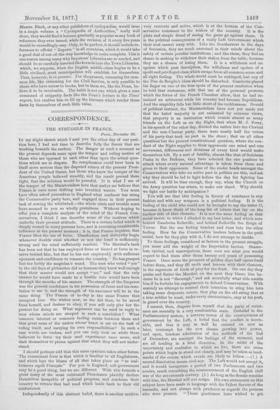DEAN STANLEY ON" CRAMMING" FOR COMMON LIFE. ITHE Dean of
Westminster will not give us that lecture we
want of him, a good solid 2 NNW lecture on the beat method of self-education for grown men who have already learned a good deal ; but he gives us every now and then one of the hints which should have gone to the more complete perform- ance, and we take what we get, without repining. He gave such a hint on Saturday, in his extraordinarily discursive chat with the audience collected at the Arts Society, which the Times has boiled down into a paragraph, apparently by the summary and slightly bewildering process of leaving out all the connecting thoughts. The Dean, we imagine in the absence of a full report, wanted to give his hearers a most valuable piece of advice, namely, to culti- vate the art of "hunting up," or "questioning," or "cramming," as one which would greatly increase their knowledge without adding to the burden of life ; and then gave some illustrations of his own recent efforts to hunt up facts that momentarily in- terested him, which so attracted the reporter that he gave the stories, without the governing thought which made them apposite. The lecture is like a pudding without flour. This La a pity, for the Dean in his chatty way always makes an im- pression, and his advice was undeniably sound. Young men of the regular training always want as they enter manhood a quan- tity of miscellaneous knowledge, the absence of which oppresses them, and which they are curiously embarrassed how to get. The knowledge was not in their school-books, and their lecturers who had it never gave it forth. There is no better way than to culti- vate the art of hunting up,—that is, to resolve persistently not to be satisfied till you feel you know well the subject on which acci- dent shows that you are partially ignorant. It is by no means pleasant work. The knowledge never seems so important when the occasion for its use has passed away, the trouble of bunting through books and cycloptedias and dictionaries is, as the Doan allows, very considerable, and an expert is not always accessible or willing to be examined. Still the young of to-day have got one virtue out of the rather cynical tone of the age, and very seldom think that they know what they do not know, being rather inclined to say they know nothing, and are therefore en- titled to smoke in apologetic apathy ; and some of them may hearken to the Dean, and worry themselves a little to get up the knowledge circumstances suggest to them. They will find, if they acquire skill in the art, that it will do wonders for them ; that in three years of steady persistence their knowledge of things in general will be as much enlarged as their knowledge of Classics is after a year with a tutor ; that the habit of hunting up is the " crammer " who will tell them just what the regular tutor will not. The chinks in their knowledge will be filled up, chinks which let in all manner of wind. Let anybody of ordinary intelligence who doubts this just recall how he got up his knowledge on any point where if was imper- fect. A rebellion has broken out in a colony he knows nothing about, though he has certain vague impressions that it exists, but as his brother, or " a fellow he used to know well, you know," has a good chance of being knocked on the head, he must, for family reasons, get rid of his ignorance. Ile asks two or three people who "ought to know ;" he turns over three or four books in an intelligent hurry, avoiding the padding as a dandy avoids puddles ; and when, after a half-hour wasted as the Dean wasted his, over in- terminable cross-references and entries meant to tell him some- thing else, he at last finds the cyclopedia article he wants, he reads it as he would read his ?nemesia teelinica for an examina- tion. The whole process has not taken half his idle time for two days, but at its end, if his memory is a decently good one, he knows all he absolutely wants to know about that colony, he knows exactly where to go for still more de- tailed information, if he wants it ; and he knows enough to comprehend and pigeon-hole in his mind the quantity of snippety facts which, while that colony is "up," will keep dropping in in telegrams and letters. His entire mental attitude is changed as regards that subject from that of an ignoramus to that of a fairly well-informed person, the greatest change, perhaps, which ever occurs to anybody pursuing knowledge. You cannot swim ten yards, but you can swim, and it is not the distance in yards, but the distance between wading and swimming which it is so difficult to get over. A new power has been acquired, though its development to any respectable extent may still be a difficulty of the future.
As we understand the Dean, deferring always to that reporter, with his imbecile preference for anecdotes, he pointed out that the quickest and best way of acquiring this kind of " cram " was to ask questions of an expert, and we suppose that to be correct. We know it to be correct of all men who have learned through the medium of lectures, and see every day that men pressed for time always resort to it with a sort of instinctive confidence ; but there are, nevertheless, obstacles in the way. To teach effectively and quickly, your expert must be willing as well as competent, must be ready to stand being asked questions which he thinks questions in the alphabet, and must not be annoyed at an ignor- ance which seems to him a little impertinent. You ought not to know so little of what interests him so much. We really believe this last is the reason why it is no difficult to get in- formation about American politics out of an average American. He cannot get over a certain irritation at finding that his ques- tioner thinks New York the capital of the Union, and does not know at all that Wisconsin never was a Slave State. He ought to have known. We shall not readily forget the disgust with which a local magnate of Thursbury, who wanted dreadfully to explain a local question to the writer, and ultimately did explain it capitally, received the absolutely necessary question, "But where is Thurs- bury ?" The questioner struck him at once as a man who could not be taught, and the temper of instruction quite disappeared. When, however, the expert is both able and willing, there is no mode of " cramming " equal to asking questions. You know—what the expert doesn't—where the chinks in your knowledge are. You know—what the expert doesn't,—where your strong points are. And above all, you know—what the expert doesn't—when he is boring you to death with statements to which you want to shout out, as the Canadian Indians do to the Missionaries, "Conan, comae I" In half an hour, more good, available, "sticky" cram can be got out of an expert than can be obtained from books in half a day ; and such information is rarely forgotten, though the questioner may easily forget whence he obtained it. The ques- tioner, too, is rarely deceived after a lively cross-examination as to how much he has got, but understands pretty clearly the limit of his newly-acquired information. Still experts are not to be found by boys as they are to be found by popular Deans, and failing ex- perts, the best resort is to books. But what books? We should agree decidedly with the Dean in recommending encyclopedias, if only they are treated as what they are and always must be, dictionaries, indexes, guides, manuals, and not compendiums of human knowledge. If you are only lacking particular facts, or dates, or names, they will supply them ; but if you want to be really informed, they are more valuable as guides to the first books to be looked at than as anything else. An article cannot give the inquirer the rounded knowledge even one good book can. There are exceptions, no doubt, special articles in the "Encyclopedia Britannica," particularly, containing all it is worth while for any one not intending to be an expert to know ; but as a rule, a book, and a good book, or better still, if you possess the faculty of consulting books without reading them, half-a-dozen good books, are essential to a long step in that mode of swift education which we have called "cram." So essential are the books, that we believe if Messrs. Chambers, or Messrs. Black, or any other publishers of cydopredias, would issue in a single volume a " Cyclopredia of Authorities," really well done, they would find it become gradually as popular as any book of reference they ever issued, while the revision of it every five years 'would be exceedingly easy. Only, to be perfect, it should include re- ferences to official " Reports" in all countries, which it would take a good deal of out-of-the-way knowledge to make complete. This is one reason among many why Inquirers' Libraries are so needed, and should be so carefully inserted like kernels into the Town Libraries, which, we suppose, when the English middle-class begins to be a little civilised, most municipalities will establish for themselves. That, however, is en passant. For thepresent, cramming for corn- anon life, like cramming for the Civil Service, is only possible to those who have access to books, but to them we, like the Dean, be- lieve it to be invaluable. The habit is not one which gives a man command of snippetty fads like the Dean's lecture in the Times' report, but enables him to fill up the hiatuses which render those facts by themselves of such little value.







































 Previous page
Previous page